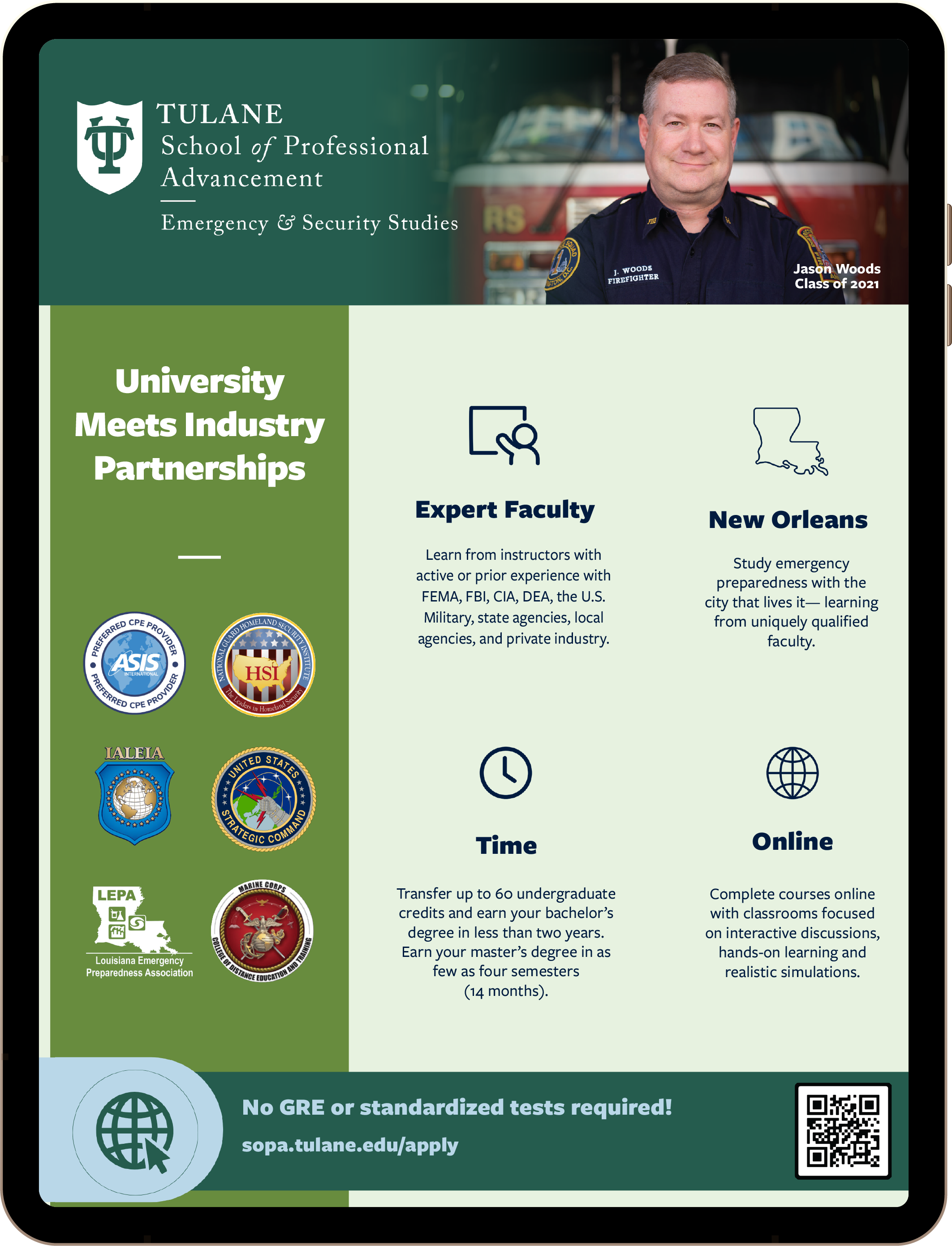Master of Professional Studies in Emergency Management
Request Information
By submitting this form, you agree to receive information about the Tulane School of Professional Advancement’s programs via email, phone and/or text. You may opt out at any time.
Master’s in Emergency Management Degree at a Glance
Grow your skills in the field of emergency management with an advanced degree available entirely online through the Tulane School of Professional Advancement. The Master of Professional Studies in Emergency Management consists of nine core courses in a range of academic disciplines, such as homeland security and approaches to counter-terrorism, emergency management administration, and disaster communications.
Depending on your specific interests and professional goals, you will also have the choice of taking one elective course in sport/event security and response or leadership, influence, and decision-making in disasters. Upon completion, the master’s in emergency management program finishes with a career-focused capstone course that will allow you to integrate and apply key concepts through a business-based project conducted at a public or non-profit sector entity.
TRANSFER
Transfer up to nine credits of graduate level courses to your program and earn your degree for less.
FACULTY
Nationally recognized faculty who practice what they teach and help you succeed beyond the classroom.
LOCATION
Flexible online courses that match your schedule. Accelerate your career without putting your life on pause.
BENEFITS
Course credit for experience and 20% tuition discounts available.
ADMISSIONS
Rolling admissions. No test scores. No recommendations. Three start dates. We make the admission process easy.
What You Will Learn While Earning Your Online Degree in Emergency Management
- Risk Assessment and Hazard Mitigation: Identifying hazards, assessing risks, and implementing strategies to minimize their impact.
- Emergency Planning and Response: Developing emergency plans, coordinating with stakeholders, and managing resources during disasters to ensure an efficient response.
- Disaster Recovery and Resilience: Restoring communities post-disaster and enhancing their ability to withstand future emergencies through long-term recovery plans and resilience strategies.
These concepts equip you with the skills needed for effective emergency management across all stages of disaster.
- Disaster Communications
- Emergency Management Administration
Click here for a listing of MPS in Emergency Management required courses and course descriptions.
The Tulane School of Professional Advancement awards the MPS in Emergency Management degree following the successful completion of 11 graduate courses comprised of nine core courses, one elective, and one capstone course. No thesis is required. Graduate students seeking to enroll in more than 9 credit hours per semester require approval from the Program Director. In order to earn the MPS, a student must have a cumulative grade point average of at least 3.00. Students must also apply for a degree at the beginning of the semester in which the student plans to complete all required coursework. Applications for degree conferral are now online and will appear in a student's Gibson account when available.

Flexibility to Earn Your Master’s From Anywhere
Tulane SoPA can help connect you with the resources to make going back to school your reality. As an entirely online program, the master’s in emergency management includes asynchronous learning that allows you to complete assignments at your own pace. Additionally, you can study with students from across the country, enhancing your professional network and connecting you with diverse perspectives. If you’re considering an MPS in Emergency Management, explore the program’s YouTube playlist. Watch interviews with industry leaders, get a breakdown of Tulane SoPA’s admissions process, and discover the different career pathways you can pursue.
Faculty Who Practice What They Teach
By day, our professors are leaders in the fields of intelligence, security, and emergency response. They bring their daily experience to the classroom to ensure you are learning real-world professional skills to further your career. Industry leaders serving on program advisory boards ensure faculty teach relevant curricula connected to the real-world.

Tulane SoPA Faculty Feature
“Our practitioner faculty is focused on one thing—preparing the next generation of homeland security and emergency management professionals.”
Michael Wallace, Ed.D.
Emergency & Security Studies Program Director
Retired military intelligence officer with 20 years of active service
Career Options in Emergency Management
A Master of Professional Studies in Emergency Management degree from the Tulane School of Professional Advancement will give you the skills and knowledge to play a leading role in protecting your community from natural and human-made hazards and disasters. This program is ideal for individuals with front-line experience, including first responders, community volunteers, and veterans or active-duty military members. You’ll build on your real-world experience to develop the strategic and analytical skills to plan for and prevent emergencies within complex organizations such as corporations, government agencies, and nonprofit organizations.
As an emergency studies graduate, you’ll be ready to pursue a career as:
- Emergency Management Director
- Operations Specialist
- Business Continuity Planner
- Safety Manager
- Training Coordinator
- Federal Coordinating Officer
- Emergency Management Site Inspector
- Hospital Emergency Manager
- Public Health Emergency Preparedness and Response Manager

Tulane SoPA Student Spotlight
“SoPA gave me much more than a textbook education. It gave me the ability to approach my professional life with a broader outlook and a more capable network.”
Chris Cox
Tulane SoPA class of 2018
Engaging & Flexible Student Experience, On-Campus & Online
Partnerships that translate into industry certifications, credit for experience, & career advancement opportunities.
Never watch a boring PowerPoint. We’ve developed the most interactive courses around.
Our courses are constantly refreshed and informed by what leaders in emergency & security fields expect from graduates.
Navigate degree requirements and prepare for the workforce with help from our academic advisors and career counselors.
Tuition and Aid
Tulane SoPA is more affordable than traditional private university tuition. With limited fees and a 20% tuition discount (if qualified), the cost is on par with many state schools.
All tuition is charged by the credit hour, and we have minimal fees. Visit our tuition page to see our current tuition rates and use our net price calculator.
We strive to make higher education affordable by offering 20% discounts, financial aid, and credit for work and life experience. Learn about financial aid, discounts, and scholarship opportunities to fund your master's in Emergency Management today.
Admissions
Apply anytime—no test scores or letters of recommendation are required.
Students applying to the MPS in Emergency Management program must hold a baccalaureate degree from a regionally accredited college or university. Applications to the program must include the following:
- A statement of 250-500 words discussing their background beyond academic coursework, and how the program will assist them to achieve professional objectives.
- Official college transcripts from each college attended. Typically, successful applicants will have at least a "B+" (3.00) average in all coursework taken.
Applicants may be conditionally admitted and allowed to take one class in their first semester, in which a B or better must be earned to be fully admitted to the program. Students who do not meet the 3.00 grade point average in their undergraduate coursework but who possess sufficient professional experience in the security studies field may be admitted provisionally into the program.
Completed applications are reviewed by the MPS in Emergency Management Director, Dr. Michael Wallace, and the Admissions Committee throughout the year.
To begin the admissions process, complete the online application.
Students in good standing may petition to transfer a maximum of nine credit hours (three courses) of graduate coursework from other colleges or universities to the MPS degree. However, only courses with grades of B or better, completed within five years of enrolling in the MPS program, may be considered for transfer credit.
Master’s in Emergency Management FAQ
A master’s in emergency management is a graduate-level degree that prepares students to plan for, respond to, and recover from disasters, crises, and public emergencies. This interdisciplinary program covers risk assessment, crisis communication, disaster response coordination, and resilience planning. Graduates often work in government agencies, healthcare organizations, nonprofits, and private-sector companies to develop policies and strategies that minimize the impact of disasters and improve community safety.
To enter the field of emergency management, aspiring professionals typically need a background in public administration, homeland security, public health, or a related discipline. A bachelor’s degree is often the first step, followed by relevant work experience in areas such as emergency services, law enforcement, or disaster response. Earning a master’s in emergency management provides advanced training and leadership skills that can open doors to higher-level roles. Many professionals also seek certifications to enhance their qualifications.
Emergency management can be challenging and fast-paced, as professionals often work in high-pressure situations where quick decisions impact public safety. The job requires adaptability, resilience, and problem-solving skills, particularly when coordinating disaster response efforts. However, many professionals find the work rewarding because they play a critical role in protecting communities and saving lives. Strong preparation, ongoing training, and leadership skills gained through an emergency management master’s can help professionals manage the demands of this dynamic field.
Yes, emergency management professionals are in high demand. According to the U.S. Bureau of Labor Statistics, the job outlook for emergency management directors is projected to grow by 4% from 2023-2033. A master’s in emergency management from Tulane SoPA prepares you for a leadership role in this growing field. Learn more about a career in emergency management.
A Unique “Stackable” Certificate Program
Students in good standing may petition to transfer a maximum of nine credit hours (three courses) of graduate coursework from other colleges or universities to the MPS degree. However, only courses with grades of B or better, completed within five years of enrolling in the MPS program, may be considered for transfer credit.
Earn Your Master’s in Emergency Management Online at Tulane SoPA
Interested in putting your skills to work for your future? Start your application today to earn your degree in Emergency Management from a world-renowned university.

Enter your email to download our Emergency and Security Studies e-brochure.
By submitting this form, you agree to receive information about the Tulane School of Professional Advancement’s programs via email, phone and/or text. You may opt out at any time.














